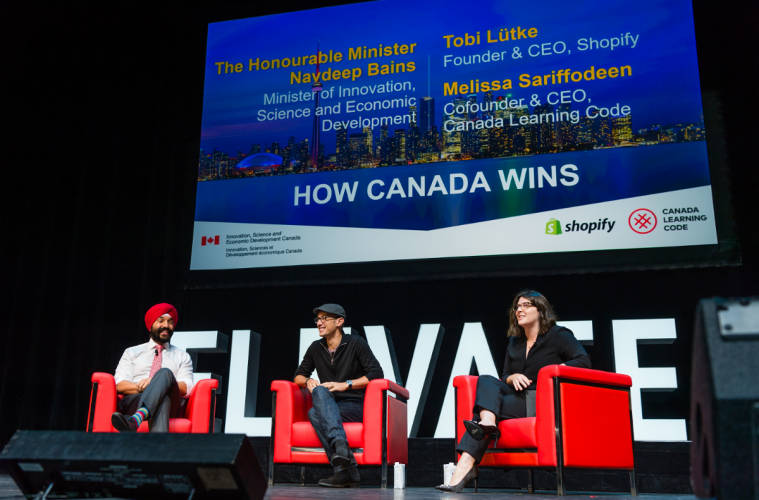For its second Toronto edition, Elevate welcomed a roster of speakers and experts in technology, innovation and culture. Speakers like Wyclef Jean, Al Gore, Spotify’s Tobi Lütke, Eric Schmidt (Google/Alphabet), Bumble’s Whitney Wolfe Herd and Square’s Sarah Friar carried out talks while sessions from companies like Condé Nast and Loblaw (who put on feast of a party at Portland Variety) made for a busy few days. Lumped in too were open houses, a hackathon, pitch and investor meetings and the NACO World Angel Investment Summit as well as VR installations and parties put on throughout the city. It was a one-stop shop but scattered around venues such as the Sony Centre for the Performing Arts, the Carlu and TIFF Bell Lightbox. Trying to catch it all was near impossible so you simply had to play favourites.
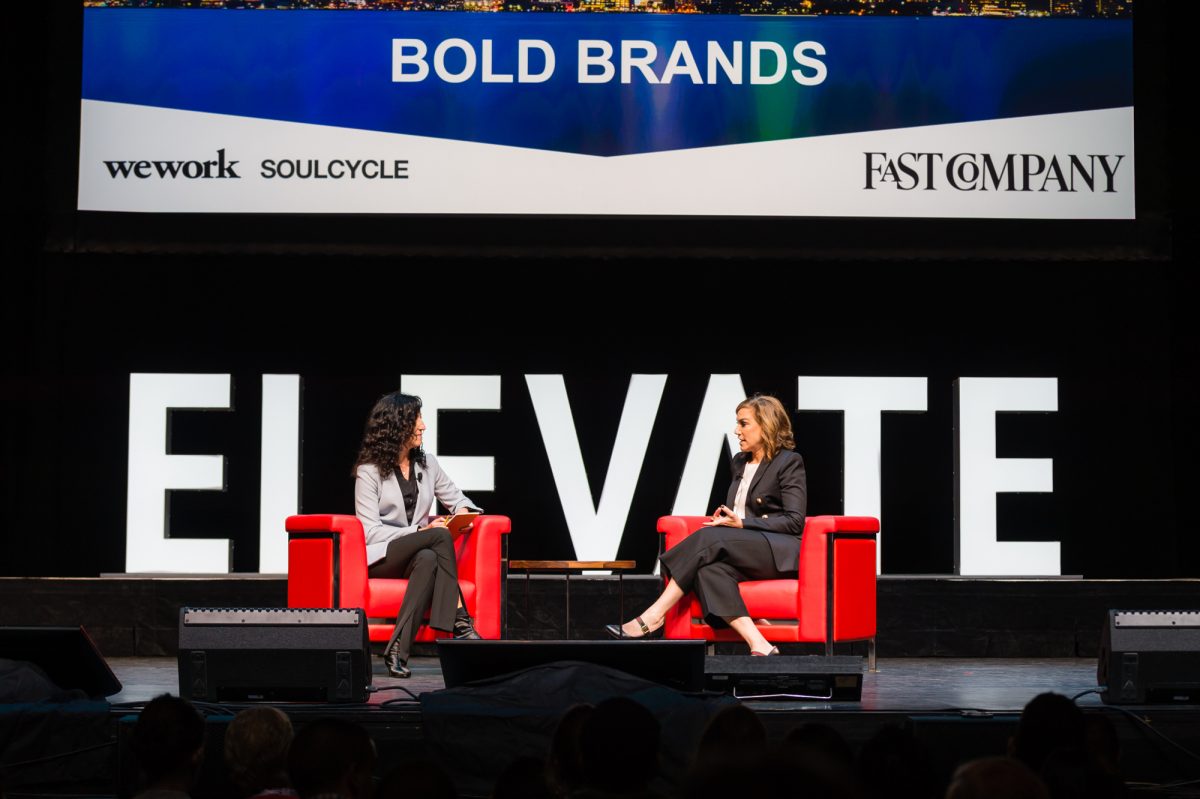
Fast Company’s Lydia Dishman interviews wework’s CBO, Julie Rice (R) / Photo by // Photagonist.ca
From Wyclef Jean’s speech on ‘Going Back to School’ and his news around the making of a hip-hop guitar to learning more about blockchain and social structures, to hearing how companies like Bumble are expanding into new business opportunities—there was an abundance of chatter, insight and takeaways that created pause and discussion.
Here’s what stuck.
Elevate Hackathon
Before Elevate was officially underway, over 500 hackers working in teams of four to eight nestled up inside MaRS to participate in the Elevate Hackathon. The task was to create the building blocks of a smart city, looking at how we might connect and innovate. This was Elevate’s first Hackathon and according to organizers, Canada’s largest hackathon of its kind, too. There was more than 21,000 hacking hours logged and $18,000 was given to winners. The winning team from Stable Hacks was awarded $10,000 and $5,000 went to the second place team, $3,000 went to the third.
Congratulations to @stablehacks for taking home first place and 10k in prize money during the first ever #ElevateHackathon created by @TD_Canada! We loved your OpenDoor technology and ideas around building community for condo and apartment living. #ElevateTechFest pic.twitter.com/4JazCQc4Ss
— Elevate (@ElevateTechFest) September 24, 2018
The event hosted different ‘tracks’ focused on areas like health, fintech, AI, social impact, product and cannabis.
Throughout the festival, we couldn’t help but bump into members from The Knowledge Society, an incubator formed for students wishing to get more involved in technology and innovation. One of the breakouts of the entire festival and member of The Knowledge Society was 16-year-old, Ananya Chadha. Chadha is also a blockchain developer intern at ConsenSys and works in brain-computer interface development.
After her speech on the Elevate main stage, the crowd immediately cheered in unison while quickly searching for her socials.
Hi friends! Finishing building my prosthetic arm+hand controlled by electrical activity in the forearm — really happy with how it turned out 🙂 @thalmic @InMoov pic.twitter.com/MyoKblcKjI
— Ananya Chadha (@ananyachdh) September 24, 2018
“I spent a lot of time thinking about how might we increase human intelligence and what the people doing it, what are they going to be like? It’s not just about understanding but being able to draw implications from a specific knowledge that you have,” Chadha said in her introduction.
She then directed attention to a number of case studies involving mice, one about blind mice trying to get through a maze. Essentially a GPS of the maze was uploaded into the brains of the mice, says Chadha, and the mice got through the maze.
Chadha talked about how one day we’ll be able to download Japanese to our brain and perhaps upload karate lessons, stressing too that brain to brain communication could be possible.
“So instead of speaking to you guys today, you guys would just already know,” she said to the audience.
She’s funny too.
Wyclef Jean ‘Goes Back to School’
There was a serious energy when the former Fugees’ member took the stage, instantly hearing his voice brought us back. We learned that Wyclef is bringing attention back to schools, specifically to music students in schools, as he believes this is where it all begins and fostering talent should start young. The purpose of his ‘Back to School’ initiative is also to level the playing field, allowing artists that don’t boast huge followings, likes, tweets, whatever the soul-sucking ploy of today is, can still get noticed based on their talent, not their speculative influence. What a concept. The ‘Back to School’ initiative also encourages students to compete in a battle of the bands, giving equal opportunity to everyone.
“I embarked on this journey to go back to the physicality of being in these rooms and searching for a level of talent that’s not necessarily on the dial yet,” says Jean. “We want to show kids that we appreciate their level of talent.”
“If you put an artist that has 20 million views against someone playing guitar for the first time, how are you going to judge? Are you going to judge by analytics or by how you feel and how the music makes you feel?” he asked the audience.
He mentioned his upbringing in Haiti and how he had “the idea of imagination” and when he heard thunder and lightning to him “it was the orchestra” which helped him attach to music.
He also talked about his new offering, a hip hop guitar which was built on the love for jazz and fusion seen in hip hop. The front of the guitar is a string guitar (“I ain’t creating no Guitar Hero here, it’s real strings you have to play”) and when you reverse the guitar it is a drum machine. That’s about all he said because “I ain’t going to tell you how I do the flip yet because I don’t want anybody to steal my idea,” he said while awkwardly laughing yet completely serious. The guitar should be rolled out in 12 months and Jean mentioned he is funding it and taking the risk because he thinks the new instrument is going to revolutionize the game.
Wyclef also performed at Elevate.
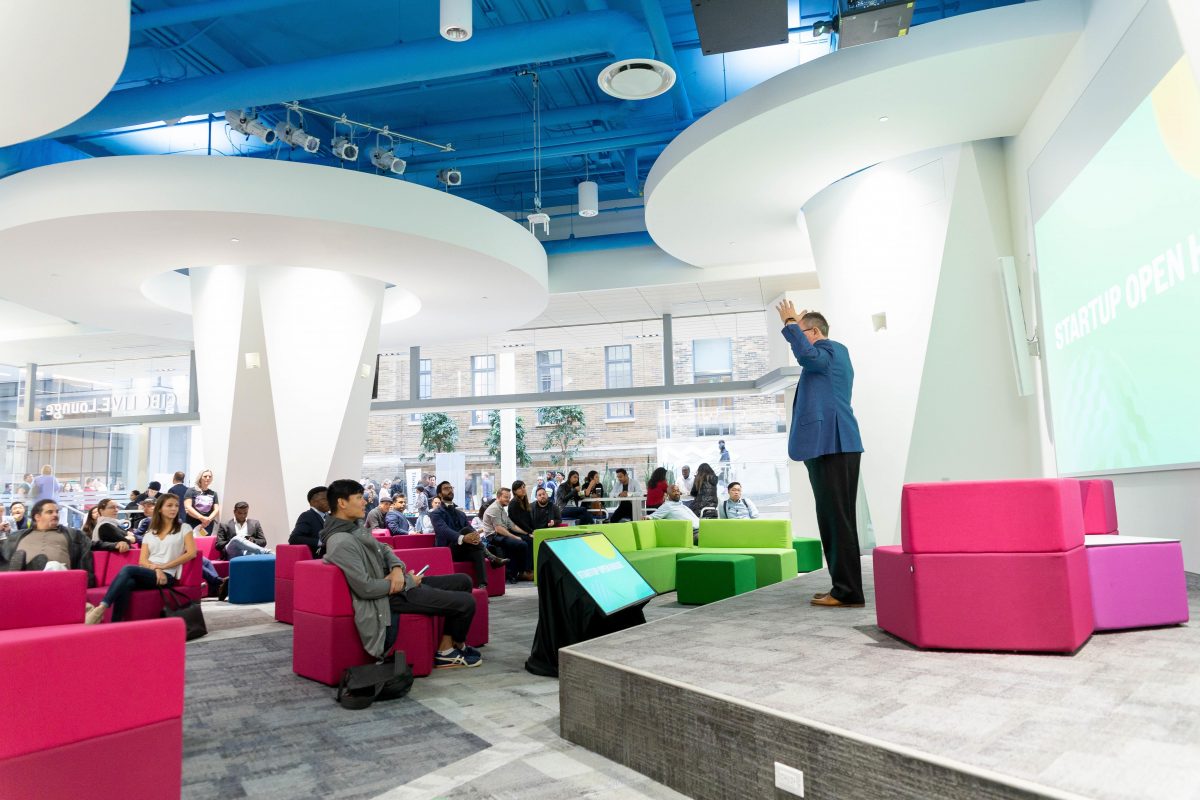 Start-up open houses and discussion at MaRS / courtesy of Elevate & MaRS
Start-up open houses and discussion at MaRS / courtesy of Elevate & MaRS
Elevate Cannabis
One of Elevate’s ‘tracks’ was on cannabis and featured speakers from MaRS, Aurora (who created the track), CAMH and Shopify. Talks about regulation, awareness and use cases for cannabis were discussed.
Sidewalk Hustle spoke with Vapium co-founder Lisa Harun, who was demoing a new medical grade vaporizer (LITE) that’s launching this week. Vapium engineers and medically manufactures award-winning vaporization products. Harun is also a start-up advisor at MaRS.
Here’s what we Harun shared with us.
Sidewalk Hustle: How does Vapium (established in 2013) position itself in the cannabis market and what are some of the challenges faced thus far working and promoting products?
Lisa Harun: Our earliest challenges included identifying credit card processors for online sales as well as [determining] appropriate language and communication, which continues to plague our industry as we are grouped with tobacco and related products, limiting our reach with paid advertising on Google and social media platforms.
Do you believe medical grade cannabis and accompanying products are going to change the way we look at health? Do you think it will be taboo?
We absolutely believe that the reclassification of cannabis and related products globally will have a significant impact on health. We believe that Cannabis 3.0 involves the trifurcation of our industry; recreational, wellness and medical. Stringent medical guidelines have set standards for cannabis that otherwise did not exist—constant testing, no additives and clean rooms yield regulated cannabis—akin to the manufacturing of pharma medicines. We believe that our SmartFlow ™ enabled devices will be able to provide Health and Stats Canada with dosing data. Our suite of products enables patients and medical practitioners to make informed decisions about their cannabis consumption patterns and treatment protocol, and our hardware and software platform tracks dosage, usage frequency and efficacy, seamlessly and effortlessly.
How was the LITE created and what was the process like?
In designing the LITE we considered multiple factors. The most critical one was providing a quality medically manufactured product (ISO13485) at an affordable price. Health Canada recommends vaporization as the preferred method of consumption, and with over 50 years of manufacturing experience, our team dovetailed all that knowledge into the engineering of the LITE.
From the inception of Vapium, we invested in our own manufacturing facility. We control our complete supply chain and select materials that are medical and food grade. Our heating technology is ceramic, which is very clean and easy to clean. We also feature a patent-pending clean-air intake manifold and removable crumb drawer that ensures clean air enters the heater chamber and does not propagate past heated electronics to be mixed with your vapor.
Bumble’s Whitney Wolfe Herd
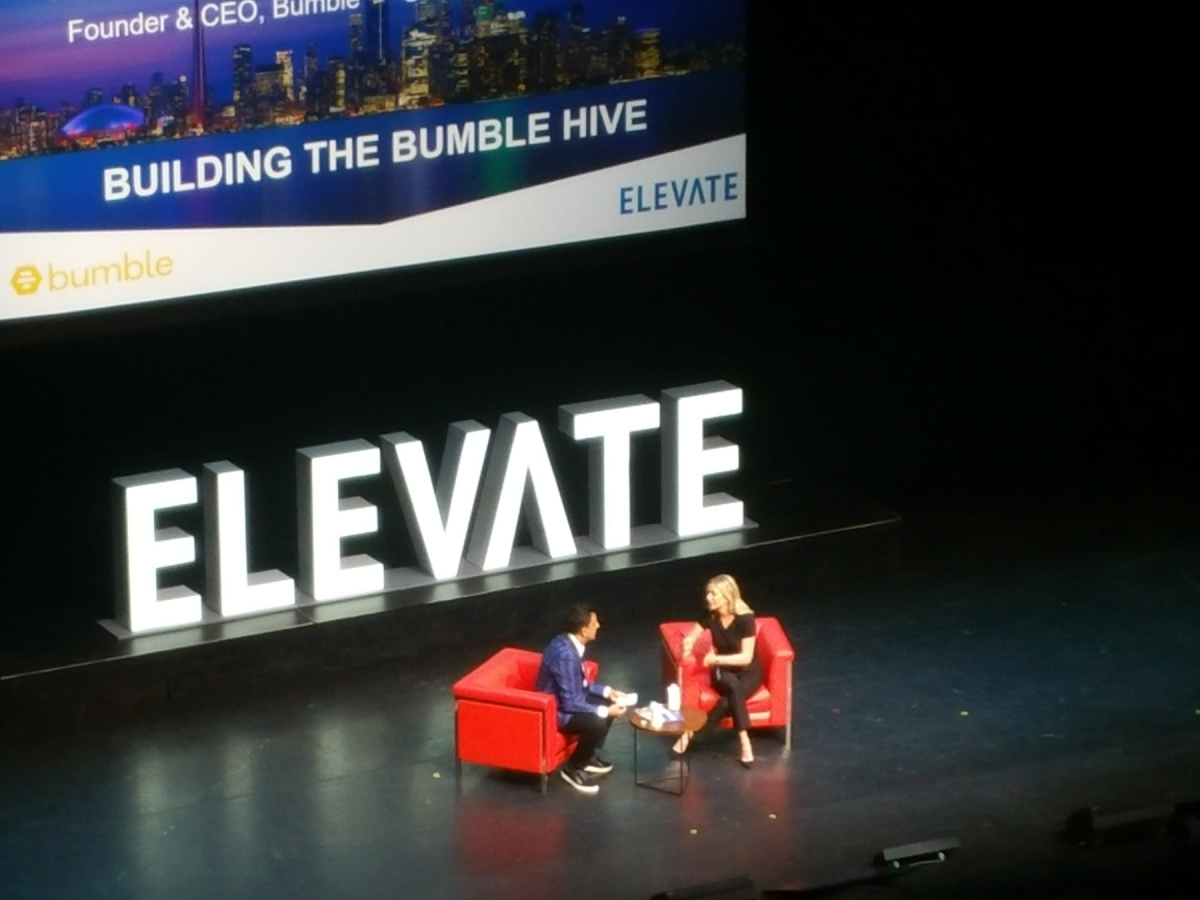
Whitney Wolfe Herd, founder and CEO of Bumble, was deeply articulate about her desire to change the world and along with her talk, the company also hosted a sweet pampering session with cocktails as part of Elevate King West (parties and events stretched around King Street). What started as a dating app where women must make the first move has now spawned into more networking opportunities with Bumble Beauty and Bumble Bizz.
Herd spoke on how the company is reinventing the beauty market from a mental health perspective as well as the popularity of Bumble BFF, which connects female friends in different cities wanting to “meet up and do hot yoga and watch Netflix,” for example. The company also recently added badges to help filter who is there for what too, providing more screening and “stabilizing the hookup notion.” Herd said in 2019 they plan to go even further.
“We are wanting to make certain behaviours illegal and some of the behaviours we are trying to police on the platform, you’re going to see us campaigning to government, too,” she said.
Sarah Friar from Square
Another interesting talk came from Sarah Friar who is the CFO of Square. Whether it was her career advice, her standpoint on work (and pet peeves) or her thoughts on behavioural economics, Friar, who is originally from Northern Ireland, impressed.
Friar said in order for Square to get customers and retain them, it’s important to be a company that is modelled on self-serve and speed. Sophistication is key, too. Friar also talked, only very briefly though, about how cash is anonymous and mentioned the benefits of Square’s payment processing method.
“We wanted people to get on board in minutes, and this involves a lot of data to understand the risks,” said Friar. “We also wanted it to be fast because we think that fast is ‘wowing’ so if you’re a small business you can get access to your revenues the next day, for example.”
Some other of our favourite quotes from Sarah Friar below.
“Most small businesses don’t go out of business because they don’t have enough cash, it’s because they don’t have enough cash flow.”
“Get an adrenaline rush, everyday.”
“The gift of good work is more good work. People need to feel pushed and that feeling of achievement is huge—it’s what gets them going to get up in the morning.”
“The starting point is to build a remarkable product and to understand the customer struggle.”
“A pet peeve of mine is innovation teams or heads of strategy, same thing. Effectively what you’re saying to everyone else that’s not on the team is ‘don’t worry about anything, about strategy, we’ve got it covered’.”
“Great ideas come from everywhere…I want my core finance team to feel just as much in charge of thinking of great product ideas as the engineer that’s building the next feature.”
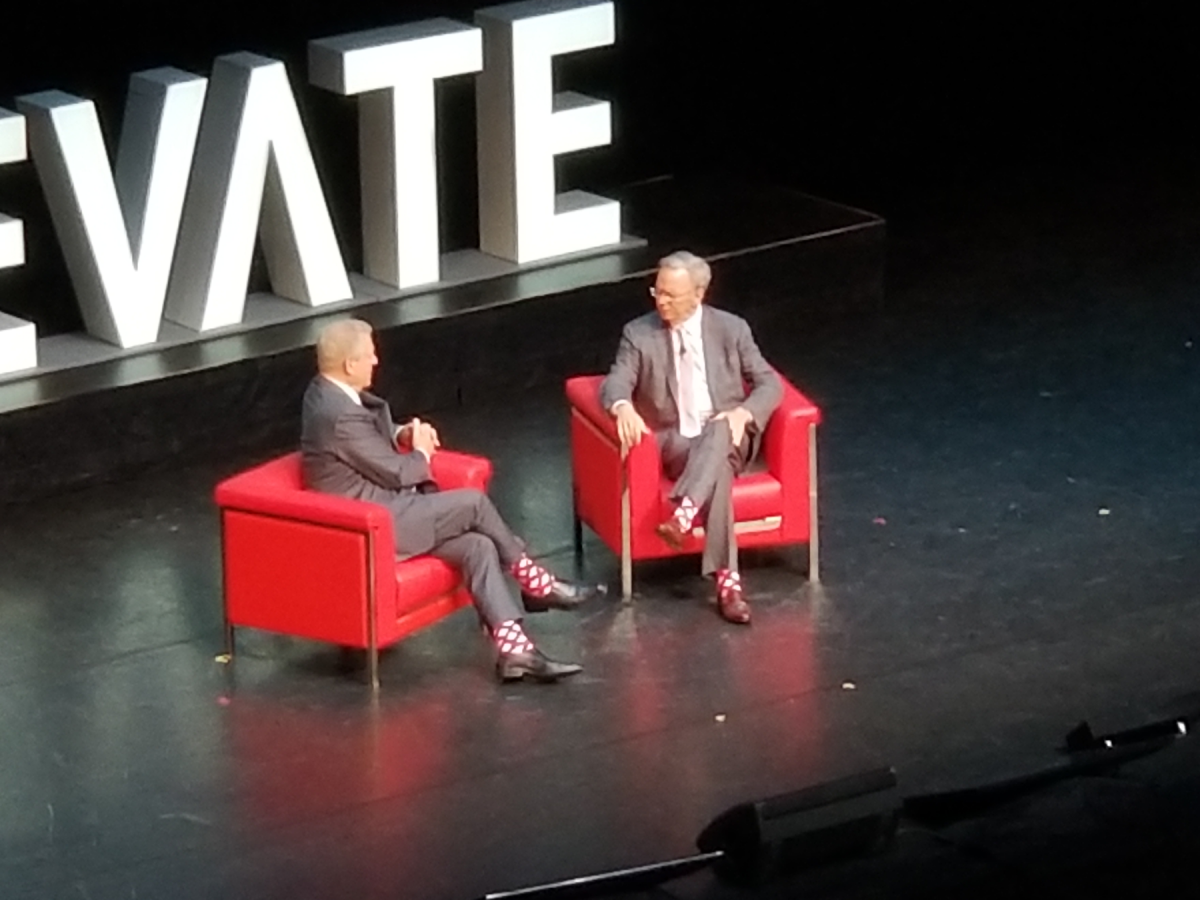
Al Gore (L) and Eric Schmidt (R) speak
Eric Schmidt of Alphabet and Google (former executive chairman) said that the next opportunity in tech innovation is around the applications running on an Android or iPhone. He also advised the audience that more software needs to be created and Canada needs to step up. “And I’m not necessarily suggesting computer science. I’m suggesting digital in a broad sense like biology, in mechanical things, in construction,”said Schmidt.
When Al Gore took the stage to stress issues around the climate crisis and how technology could help, he asked three questions on if we need to change (he says YES), if we can change (“this is where tech comes in and plays a major role”) and will we change?
He brought up innovation like blockchain technology after talking about poor working conditions in Bangladesh, referencing issues from years back. He stated how blockchain could help trace where clothing and goods are being made and help stop poor work conditions. Blockchain presents an open ledger so sourcing would be visible, allowing everyone to know what plant or facility is being used and where it is located. Transparency.
For Gore it’s about “putting technologies in the hands of people so they can express their desires and use the force of their conscience.”
One of the final talks we caught was with Matthew Spoke from Aion, who talked about decentralization and the future of blockchain, smart contracts, dApps (decentralized apps), tools and more.
He mentioned that years back an investor in the dot-com era told him that he didn’t know the difference between email and internet and thought it was the same thing, synonymous with one another. Spoke correlates this confusion to what we’re seeing today with blockchain and cryptocurrency (which in Spoke’s example, cryptocurrency would be the email of the two).
“Internet was significantly more impactful and more important,” he says. Yet during that time it was still a wait and see type scenario much like we are witnessing in this space today.
For Spoke, “The new internet has yet to be built” and newer projects will continue to pop up, many facilitated through the Aion Network.
Featured and main photo: Photagonist.ca
Other photos: KK
